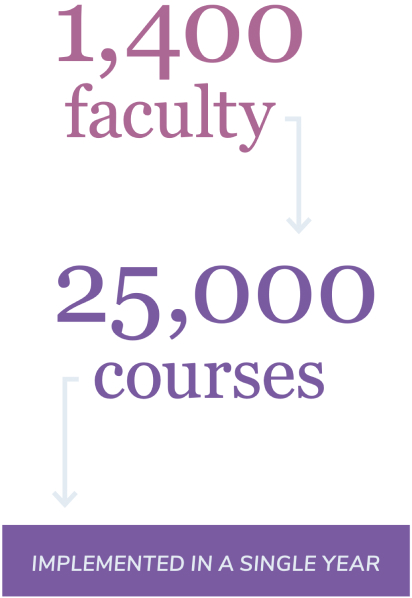Seamless access across learning modalities
Application access that was previously clunky and difficult for learners has become as easy for them as using any of their other preferred applications. For PXL, this isn’t a case of making the lives of a secondary population of learners better—it has impacted its entire student population for the better.
Because every learner at PXL undergoes significant segments of remote learning and spends time in their professional field off campus, it’s essential that they maintain uninterrupted access to the LMS. Using whatever device is most convenient in their learning environment, learners can access and utilize the full functionality of Learn Ultra.

Faculty focused on educating, not navigating
Just as Anthology strives to place educators at the forefront of product development, PXL believes in letting its educators focus on their best and highest work. One of Learn Ultra’s distinct advantages for the university has been the fixed course view function.
Fixed course view standardizes the interface for course content, eliminating the need for faculty to spend time struggling with formatting the structure of their course delivery. And it removes any issues optimizing the course for participants using different devices.
“The educator has a focus on just one box, the content area. That's their focus, not the focus on structures at the left or on menus,” said Kristiaan Mesens, digital learning designer at PXL University of Applied Sciences and Arts. “And that's something really powerful. To allow the teacher to have something to focus on, and that's their expertise.”
But faculty feedback hasn’t stopped there. Given the reality that a PXL student may be learning from anywhere in a self-led capacity, faculty can now track learner progress without barriers.
In the work with self-based courses, students and educators can see what is happening in the professional field, online, or on campus. That educator has always the overview of where the student is in the course. And that's the first big advantage of [Learn] Ultra.
Kristiaan Mesens, Digital Learning Designer, PXL University of Applied Sciences and Arts
An unprecedented implementation

Mesens explained what PXL sought to accomplish with its switch to Learn Ultra, “We had one simple goal. A difficult one. But one specific big goal. Full transition to [Learn] Ultra in one year. And we succeeded.”
Mesens had this to say to anyone considering implementing a new LMS, “My first advice, dare to jump.”
PXL recognized that migrating to something new would be a major challenge for the institution. But its philosophy is that any decision is better than indecision.
In the case of Learn Ultra, Mesens advises developing a solid implementation strategy with the input of all stakeholders. “My second advice is a lot of communication,” he said. PXL dedicated a significant amount of time to communicating what they needed to do prior to making the decision to implement Learn Ultra. PXL recognized the need for a change management plan to be brought into by the institution ahead of taking the jump.
The university also believes a central piece of its successful transformation was providing its faculty with a thorough understanding of the “why” behind the change. “Give your educators a good reason,” said Mesens, “a good strategy, a compass for the transition. And get their expectations, and give real answers to their expectations.”
In practice at PXL, this took the form of discussions with each faculty department about the upcoming project and constant communication—every two weeks—with progress updates during the implementation.
“We wanted to make it almost impossible to not know what was happening about [Learn] Ultra,” said Mesens.
What's Next
PXL’s long-term goal is to create a university where every single course is available in a way that the learner can choose how they learn, asynchronously or synchronously—where a program is a great balance of the three dimensions to learn. Its vision for the use of Learn Ultra is to make mixed learning even more fundamental to the institution. They want to create each course with all of its facets completely accessible in any form—so that a learner can learn any course’s material on campus, remotely online, or through practical applications in the professional field.
“That's maybe an ambitious goal to achieve,” Mesens said, “but I think we have to be ambitious. So if we can create a future where the student always has the opportunity to choose the way they want to learn, we can really call that an X-factor.”
A Shared Philosophy
Anthology and PXL agree on a fundamental part of the relationship between technology and education. Both organizations see keeping education immersed in the forefront of today’s and tomorrow’s technology as essential to their competitive edge. But that attitude comes with a deep respect for the human element of educational institutions. Allowing educators to focus on educating is central to PXL’s and Anthology’s strategies.
Educators like those at PXL will continue to inform the shape of Anthology’s products, and it is that understanding that will allow Anthology to help educators focus on what they do best. That is, saving them from wrestling with poor UX or from wasting valuable time working around dysfunctional features.
In a world that's becoming increasingly technological, we as humanity maybe need to become more human. And that's our X-factor. That every excellent professional always remains the expert. It's how we use technology that determines the value of it.
Kristiaan Mesens, Digital Learning Designer, PXL University of Applied Sciences and Arts





